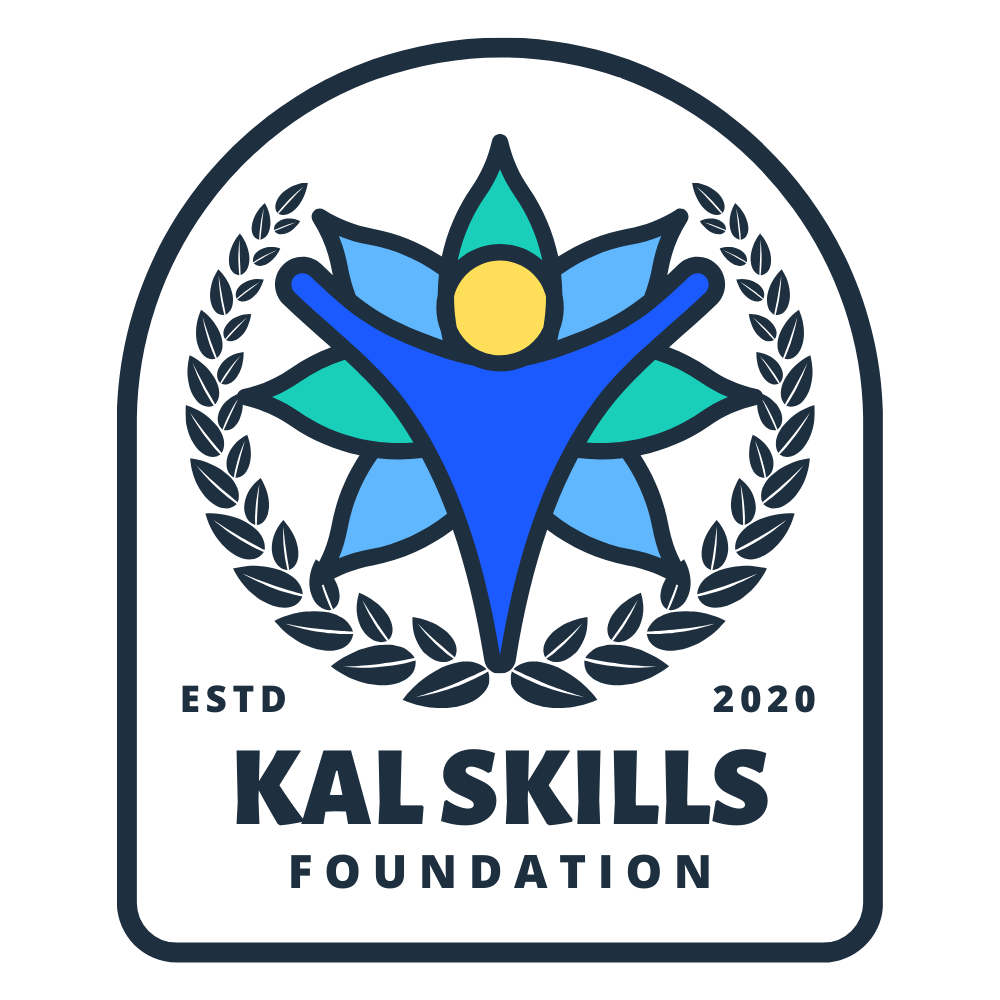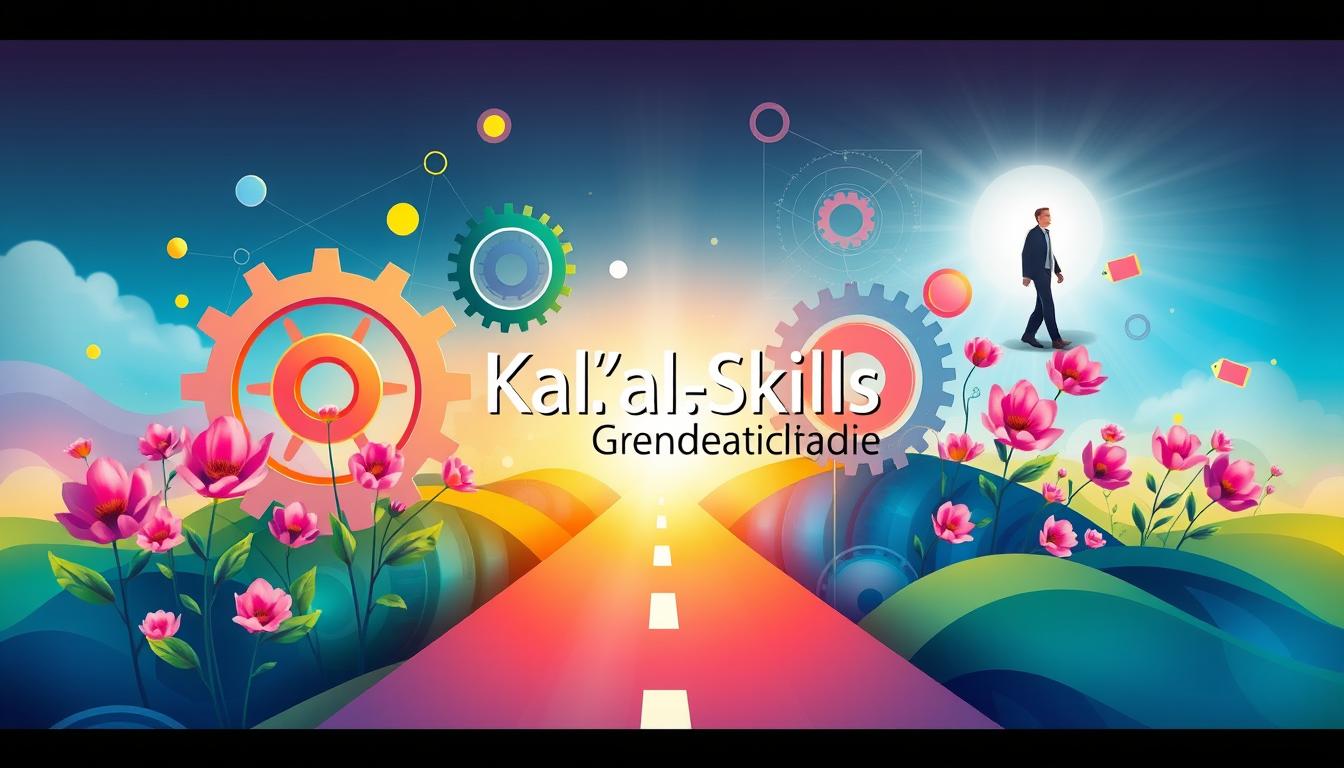Have you ever thought about how combining your life experiences and skills could shape your future?
The idea of life and skills integration is more than just a trend. It’s a key strategy for dealing with today’s fast-changing job market. By understanding this integration, you can boost your professional and personal growth. This leads to better career success. Life skills education helps students stay in school longer and do better in their studies1.
In today’s world, we need skills like critical thinking, creativity, teamwork, and good communication2. The connection between your life experiences and skills is crucial for reaching your full potential.
Learning essential life skills helps you tackle challenges and make smart choices1. This approach to development not only improves your behavior and commitment to your goals. It also helps you adapt to changing career needs. In this article, we’ll show how adopting a lifelong learning attitude and honing your skills can lead to career success and personal growth.
Key Takeaways
- Life skills education can significantly reduce dropout rates among students.
- Critical thinking and collaboration are essential components of 21st Century skills.
- Personal and professional development requires ongoing learning and adaptability.
- Effective communication is a vital skill for navigating workplace challenges.
- Integrating life experiences with skills fosters greater commitment to career goals.
The Importance of Life and Skills Integration
Life integration and skills integration are key to your growth and career development. They help you adapt to a fast-changing world. Studies show that mixing life skills with education is vital for young people, especially those facing tough times3.
The recent pandemic has made it clear that learning life skills is urgent3.
To succeed today, you need to develop soft skills like critical thinking and teamwork. These skills, recognized by the World Health Organization, improve your thinking, empathy, and emotional strength4. Effective life skills education involves teamwork, creating new curricula, and training teachers. This supports your career and personal growth5.
Learning life skills helps you gain important abilities like teamwork and communication. Schools are now teaching these skills to make sure graduates are ready for life’s challenges4. Despite challenges like too much curriculum and differing opinions, the benefits of better education and job readiness are huge5.
Understanding Professional Development
Professional development is about growing your skills for career success. It’s not just about school, but also learning on the job. A big part of it is improving both hard and soft skills to fit your career goals.
There are many ways to develop professionally, like IT training or health and safety workshops. When companies invest in their employees, they attract better talent. This also makes employees happier and more loyal67.
Employees who learn and grow are more likely to take on leadership roles. They also make more money with certifications and build strong networks6. Good time management in learning can make you more productive and respected at work7.
| Aspect of Professional Development | Impact |
|---|---|
| Employee Engagement | Increased job satisfaction and morale |
| Skills Enhancement | Greater productivity and efficiency |
| Networking Opportunities | Enhanced career progression |
| Leadership Opportunities | Higher potential for promotion |
| Company Loyalty | Longer employee retention rates |
In summary, embracing continuous learning through professional development not only equips you with essential skills but also positions you for greater success in your career.
The Role of Personal Growth in Your Career
Personal growth is key for career success. It includes emotional intelligence and good communication skills. It helps in making better decisions and setting clear career goals. A survey found that 87% of professionals see personal growth as vital for success8.
Those who focus on self-improvement do well in their jobs. They handle challenges better and build strong professional connections.
Today, investing in personal growth is more important than ever. It includes training in mindfulness and resilience. Research shows that those with high emotional intelligence are 20% more likely to move up in their careers8.
Also, aligning personal values with work choices boosts job satisfaction by 30%8.
Learning continuously helps grow your skills and knowledge. Goal-setting is crucial for career progress. For example, 94% of those who grow personally also set career goals8.
Personal growth networks can greatly influence your career. 85% of professionals say networking has helped their careers8.
| Benefit of Personal Growth | Statistic |
|---|---|
| Essential for career success | 87% of professionals agree8 |
| Advancement likelihood | 20% more likely with high emotional intelligence8 |
| Increased job satisfaction | 75% prioritize learning report fulfillment8 |
| Networking impact | 85% attribute success to networking8 |
| Employee retention boost | 15% increase in companies supporting growth9 |
In summary, personal growth leads to a rewarding career. It boosts emotional intelligence, skill development, and professional relationships. Your career success depends on your commitment to lifelong learning and personal growth.
Key Skills for Career Success
Getting ahead in your career depends on a mix of important skills. These skills are needed in many fields. Knowing that skills you can use in different jobs are key is important. Employers look for these skills when they interview you10.
Skills like talking well, working with others, and solving problems are crucial. Being good at handling tough situations can make you more attractive to employers. It can also help you earn more.
Studies show that most employers value personal and teamwork skills the most. Yet, finding these skills in job candidates is a big challenge11. Over half of employers find it hard to find graduates who can adapt and solve problems well11.
This means that improving your soft skills can open up better job opportunities. Skills like communication, taking the lead, and starting projects are highly valued.
The World Economic Forum says that many top skills for the future are about working well with others. Skills like paying attention to details, being tech-savvy, and being flexible are key in today’s jobs11. Working on your teamwork skills can make you stand out as a leader and team player.
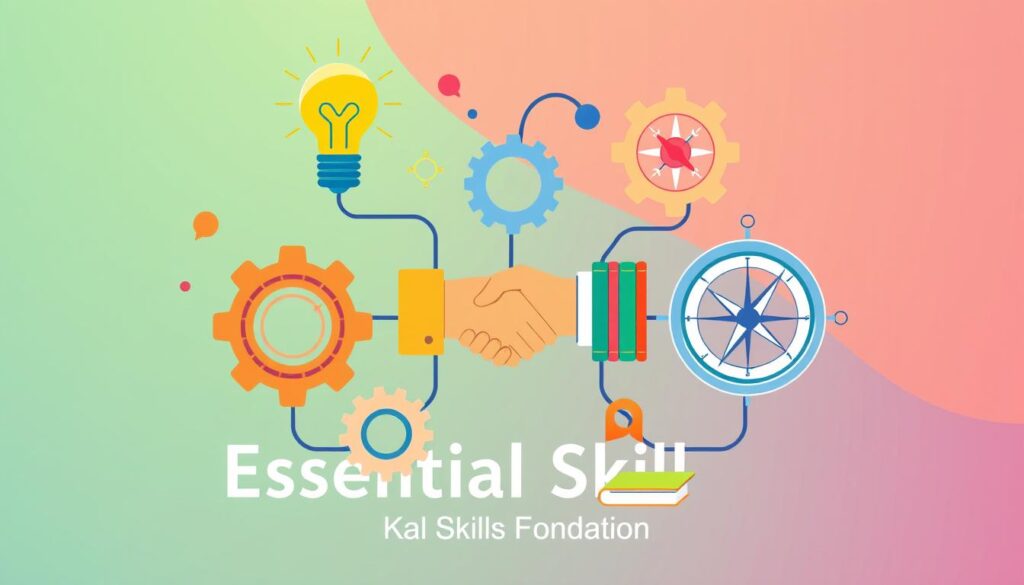
Building Effective Working Skills
To do well in your job, you need to develop both technical and soft skills. Technical skills are key to your job, while soft skills help with teamwork and talking to others. Studies show that better teamwork can lead to a 21% increase in profits12. This shows how important it is to keep improving your skills at work.
Employers like people who work well with others, which can help your career13. Helping out with team projects can help you learn these skills. Happy workers are 31% more productive and three times more creative than sad ones12. This shows the importance of a supportive place to learn and grow.
Improving by getting feedback, checking with peers, and self-evaluation helps you meet team goals and talk better. People who use their strengths every day are six times more likely to stay engaged12. Working on your skills can really pay off in your career and prepare you for the future.
Identifying Your Skills Gap
Knowing your skills gap is key for growing professionally. A detailed self-assessment lets you see where you stand compared to your career goals. It often reveals areas you need to work on, like analytics, digital skills, and managing projects14.
Ignoring these gaps can harm your work quality and results15. It can make you less productive and lead to poor outcomes.
Studies show 69% of HR folks and hiring managers face a skills gap, a big jump from last year14. New tech is moving fast, creating a need for specific skills. This makes it hard for companies to find the right people16.
So, doing a skills gap analysis is crucial. It helps you find out what you need to improve and how to measure your progress.
When you do your self-assessment, listen to what your bosses and colleagues say. Their feedback can help shape your growth plan. It helps you overcome skill gaps and move forward in your career.
Companies that focus on these gaps can innovate and adapt better. They stay ahead in the market16. Working on these areas helps you grow and advance in your career.
Life and Skills: A Holistic Approach to Success
Achieving career success needs a holistic approach. This means combining life skills with professional growth. Studies show that focusing only on test scores can harm motivation and learning, especially for students of color. This highlights the importance of blending life experiences with work skills to create a more flexible and strong workforce17.
Using mindfulness and emotional intelligence can help manage emotions. This leads to better career results18.
Adding life skills to education helps employees deal with tough work environments. Teachers and employers should focus on more than just academics. They should also teach critical thinking, problem-solving, and social-emotional skills18. This way, students and workers can build stronger relationships and make smart choices for their future.
Understanding nonacademic factors is key to career success. Life skills education boosts relationships and mental health. These are vital for success in any job19. By focusing on the whole person—emotionally, socially, and academically—companies can build a workforce ready for any challenge.
Creating a Personal Development Plan
A personal development plan is key for your growth and career success. It starts with knowing what you want to achieve and why. This understanding keeps you motivated and focused20.
Begin by setting SMART goals. These are Specific, Measurable, Achievable, Relevant, and Time-bound. They make your goals clear and reachable, helping you stay on track20.
Setting SMART Goals for Growth
When setting SMART goals, list all the skills you need to reach your goals. Ask for feedback from others to see where you can improve20. Focus on one skill at a time to avoid feeling overwhelmed and stay on pace20.
The Importance of Self-Assessment
Self-assessment is vital in your personal growth. It helps you see your strengths and areas for improvement. This lets you tailor your learning plan20.
Workshops and professional groups offer valuable learning experiences. Keep your plan up-to-date to reflect your progress and any changes in your goals or industry21.

Emphasizing Lifelong Learning
Lifelong learning is key to growing personally in today’s fast-changing work world. It’s about learning on your own, not just in school. This way, you can always get better at what you do22. Companies now see the value in helping their workers keep learning. This boosts everyone’s motivation and confidence22.
Learning for life can be as simple as talking to people, reading, or trying new things22. Start by setting your own goals and making a list of things you want to learn. Then, find the best ways to learn those things22. Also, having a growth mindset is important. It means you’re ready to face new challenges and learn through effort23.
The job market is always changing, and we need to adapt fast. A 2019 study showed that up to 46% of jobs might change a lot or even disappear because of new tech23. So, it’s vital to keep learning new skills to stay ahead23. By always learning, you not only stay current but also grow personally.
| Benefits of Lifelong Learning | Impact on Personal Growth |
|---|---|
| Increased self-confidence | Enhances your ability to tackle challenges |
| Recognition of personal interests | Fuels motivation to learn |
| Skill development | Prepares you for future career changes |
| Improved adaptability | Helps you cope with job market shifts |
Enhancing Soft Skills for Better Performance
Soft skills are key to your career success. They make up about 85% of what you achieve over your career24. Skills like communication, teamwork, and empathy are crucial. They help create a positive work environment and build strong professional relationships25.
Soft skills training can greatly improve teamwork and collaboration. For example, a 12-month program in five factories saw a 250 percent return on investment24. Using role-playing, story-based learning, and gamification makes training more engaging and effective24.
Good communication builds trust and open dialogue in teams. This leads to better problem-solving and adaptability in changing work environments25. Soft skills are also vital for jobs that involve customer interactions. They can improve service quality and enhance brand reputation24.
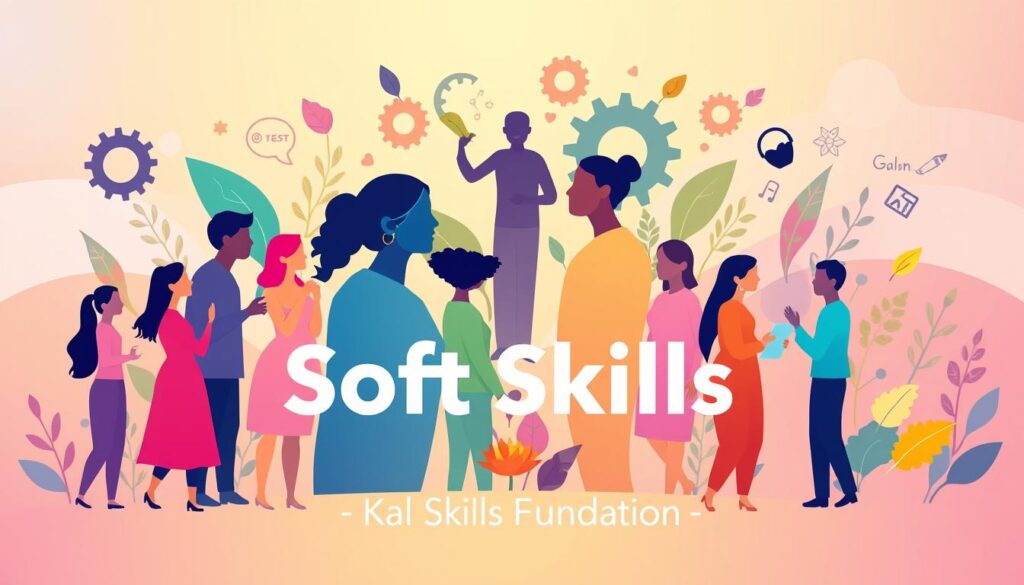
Effective time management is key to meeting deadlines and reducing stress. It makes you more reliable at work24. By focusing on tasks and staying positive, you can work more efficiently. A culture that values soft skills development empowers employees and boosts overall success25.
Networking as a Catalyst for Career Development
Networking is key for career growth. Many jobs aren’t listed online, and employers often find new hires through referrals26. Building strong professional ties lets you access hidden job markets and get crucial career insights.
Going to conferences and events is a great way to meet industry pros and peers26. Personal connections can sway hiring decisions, as employers trust referrals26. So, a strong network can lead to interviews and special job opportunities.
Using LinkedIn well can boost your networking. Sending personalized messages can help you build real connections26. LinkedIn’s alumni search tool also connects you with former classmates for valuable insights.
Informational interviews are great for exploring careers, letting you learn from professionals26. Also, being active online shows you’re knowledgeable in your field.
Your networking plan should include diverse connections. Get involved in campus and off-campus activities to see more of the job world26. This approach can lead to great rewards by focusing on relationships over personal gain27.
| Networking Activities | Benefits |
|---|---|
| Conferences and Events | Opportunities for direct interactions with industry leaders |
| Informational Interviews | Insights into specific career paths |
| Online Networking | Building a broad professional presence |
| Campus Involvement | Expanding opportunities beyond academia |
Innovative Strategies for Skill Building
In today’s work world, it’s key to keep learning new skills. Online learning platforms are a great way to do this. They let you learn at your own pace and offer many courses to choose from. This helps you stay up to date in your field and manage your time well.
Utilizing Online Learning Platforms
More and more people are using online learning to improve their skills. It’s now used by 68% of professionals28. These platforms are great because you can learn when you want, there are lots of courses, and you can learn from anywhere. Learning online helps you get better at both technical and soft skills, which is good for your career.
Participating in Workshops and Seminars
Workshops and seminars offer hands-on learning, which is very important. People who go to these events are 50% more likely to keep up with new trends than those who don’t28. These events are a chance to meet experts and others in your field. This is great for networking and learning the latest best practices.
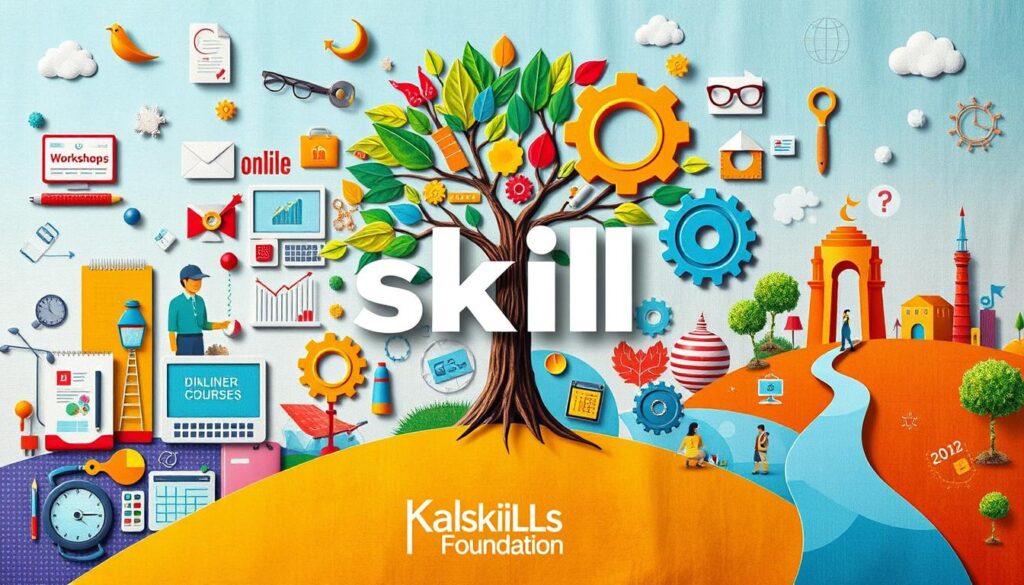
Also, having a plan for your professional growth can really help. 85% of professionals say they feel better about their jobs and careers when they do this28. By always learning online and going to workshops or seminars, you can keep improving your skills and grow in your career.
| Learning Method | Benefits | Effectiveness |
|---|---|---|
| Online Learning | Flexibility, wide course variety | 68% find it effective28 |
| Workshops | Hands-on experience, expert interaction | 50% more likely to stay updated28 |
| Seminars | Networking, collaborative learning | Positive impact on job satisfaction29 |
Measuring Progress and Adaptability
Tracking your progress is key to personal growth. Setting clear goals helps you see what you’ve achieved and what needs work. Employers value adaptability in job seekers. They look for people who are ready to take on new challenges and seize opportunities30.
Self-reflection is crucial for checking your adaptability. By embracing change, you can handle unexpected situations better. Employers want graduates who can tackle challenges with energy and speed30. Self-assessment helps you understand your adaptability better.
Being able to give examples of your adaptability is important. The STAR technique helps you share experiences that show your flexibility30. Employers look for proof that you’re open to learning and adjusting to new situations.
In today’s world, adaptability is highly valued. Many skills that support adaptability can be learned and improved. Workshops and career advice can give you the tools to grow your adaptability skills, leading to a successful career31.
| Aspect | Importance | Examples |
|---|---|---|
| Adaptability | Essential for responding to workplace changes | Learning new technologies |
| Flexibility | Helps navigate unexpected challenges | Adjusting strategies quickly |
| Resilience | Supports enduring setbacks | Overcoming job rejections |
By focusing on measuring your progress and improving adaptability, you can boost your career. This approach makes you more attractive to employers and prepares you for the changing job market.
Conclusion
Life and skills integration are key to professional success and personal growth. They show how important it is to look at your career as a whole. By always learning and improving your skills, you become better at adapting to the job market.
This is crucial for reaching your long-term goals. It’s not just about knowing more; it’s about being ready for change.
By regularly checking in with yourself, you can find areas to get better at. Then, you can look for ways to learn more about those skills. This active approach is especially important because it links to better reading and other skills from 15 to 2432;33.
By focusing on these areas, you can reach your career dreams. It’s about finding a path that truly fulfills you.
Embracing life and skills integration helps you handle today’s work world with confidence. As you grow, remember that your experiences today shape your future. They impact both your career and your happiness, showing that your success is in your hands.
FAQ
What is the significance of life and skills integration?
How does professional development impact my career?
Why is personal growth important for my career?
What are some essential skills for career success?
How can I build effective working skills?
What does identifying a skills gap involve?
How can I integrate life skills for career success?
What should be included in a personal development plan (PDP)?
Why is lifelong learning essential in today’s job market?
How do soft skills influence my career performance?
What role does networking play in my career development?
What innovative strategies can I use for skill building?
How can I measure my progress in personal development?
Source Links
- Life Skills Education – https://www.sparxservices.org/blog/life-skills-education
- What Are 21st Century Skills? – https://www.icevonline.com/blog/what-are-21st-century-skills
- Integrating Life Skills into Learning: The Need of the Hour – Dream a Dream – https://dreamadream.org/integrating-life-skills-into-learning-the-need-of-the-hour/
- A Comprehensive Guide to 21st Century Skills – https://www.panoramaed.com/blog/comprehensive-guide-21st-century-skills
- Integrating Life Skills Education into School Curricula • Teachers Institute – https://teachers.institute/childhood-growing-up/integrating-life-skills-education-school-curricula/
- Why is Professional Development Important? – Professional & Executive Development | Harvard DCE – https://professional.dce.harvard.edu/blog/why-is-professional-development-important/
- Personal and Professional Development (PPD): The Ultimate Guide – https://profiletree.com/personal-and-professional-development/
- Personal Growth and Career Development: A Symbiotic Relationship – https://medium.com/@alicescarl92/personal-growth-and-career-development-a-symbiotic-relationship-61cd7a0a30b5
- How Professional Development Fuels Personal Growth and Success – https://www.linkedin.com/pulse/how-professional-development-fuels-personal-growth-success
- 10 essential skills you’ll need for career success – https://www.colorado.edu/today/2019/04/17/10-essential-skills-youll-need-career-success
- Building Life Skills for Career Readiness and Workplace Success | Committee for Children – https://www.cfchildren.org/policy-collateral/one-pagers/building-life-skills-for-career-readiness-and-workplace-success/
- 10 Effective Ways To Enhance Teamwork Skills – https://www.tinybchocolate.com/tactics-to-enhance-teamwork-and-make-the-dream-work/
- What Are Teamwork Skills? Build Skills For Life And Work – Youth Employment UK – https://www.youthemployment.org.uk/young-professional-training/teamwork-skills-young-professional/
- Skills Gap Analysis: All You Need To Know [FREE Template] – https://www.aihr.com/blog/skills-gap-analysis/
- How to Identify & Close Knowledge and Skills Gap at Work? – https://disprz.ai/blog/how-to-identify-knowledge-and-skill-gaps
- 6 Steps to Identifying the Skills Gaps in Your Organisation – https://eurekos.com/6-steps-to-identifying-the-skills-gaps-in-your-organisation/
- The Lasting Benefits of a Holistic Education – Saint John’s Prep – https://sjprep.net/prep-stories/the-lasting-benefits-of-a-holistic-education/
- Holistic Framework – https://www.act.org/content/act/en/college-and-career-readiness/holistic-framework.html
- Life Skills: Nurturing Holistic Growth in Education – PAL Network – https://palnetwork.org/life-skills-nurturing-holistic-growth-in-education/
- How to Create a Personal Growth and Professional Development Plan – https://www.snhu.edu/about-us/newsroom/career/personal-development-plan
- How to Create a Personal Development Plan: 3 Examples – https://positivepsychology.com/personal-development-plan/
- Lifelong Learning: Meaning, Importance, Benefits & Examples – https://www.valamis.com/hub/lifelong-learning
- Creating a Passion for Lifelong Learning – Studies Weekly – https://www.studiesweekly.com/creating-a-passion-for-lifelong-learning/
- The Best Soft Skills Training Strategies to Boost Team Performance – https://www.articulate.com/blog/the-best-soft-skills-training-strategies-to-boost-team-performance/
- Enhancing Soft Skills in the Workplace: A Comprehensive Guide | HROne – https://hrone.com/blog/enhancing-soft-skills/
- Networking: a catalyst for your academic and career success — University Affairs – https://universityaffairs.ca/career-advice/graduate-matters/networking-catalyst-academic-career-success/
- Networking-a life skill and catalyst – https://www.linkedin.com/pulse/networking-a-life-skill-catalyst-kerryn-powell-ysmvc?utm_source=rss&utm_campaign=influencers_en&utm_medium=google_news
- 11 Ways to Develop Skills and Knowledge for Work – https://www.mbopartners.com/blog/how-manage-small-business/how-to-keep-your-skills-and-knowledge-current-and-why-it-matters1/
- 7 Innovative Ways to Support Skills Development in the Workplace – https://www.proprofstraining.com/blog/innovative-ways-support-skills-development-workplace/
- University of Bradford – https://www.bradford.ac.uk/careers/develop-skills/adapt-flex/
- AQai Adaptability Leadership Articles – https://www.aqai.io/blog-article/4-key-abilities-of-adaptability-you-can-learn
- PDF – https://www.oecd-ilibrary.org/conclusion_5k9bm74jgsxv.pdf
- “Life Lessons”, Conclusions and Recommendations on the Purpose of PSHE and SRE – https://3diassociates.wordpress.com/2015/02/26/life-lessons-conclusions-and-recommendations-on-the-purpose-of-pshe-and-sre/
